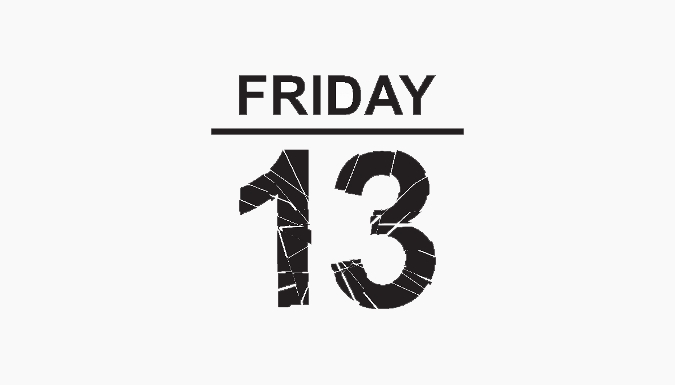A look at a current news item through the lens of different Gale electronic resources.
By Michelle Eickmeyer
Here we go – it’s Friday the 13th! Long held to be back luck, Friday the 13th has the dubious distinction of being a problem. But are you superstitious? And is everyone superstitious in the same way?
As an American, I think it’s weird that people in Europe don’t put ice in their drinks or serve their drinks cooler than room temperature, by and large. That you sometimes kiss people hello two times, or three times, or just once but on the lips. That when you give someone the peace sign it really matters that you hold out your hand with your palm facing them. (Learned that one the hard way…) Don’t let black cats cross your path. Don’t step on sidewalk cracks (oh, the poor mothers out there). Don’t break mirrors, look away while “cheers”-ing, forget to wear green on 17 March, open an umbrella inside, hold toads, give an empty wallet, walk under ladders, or forget to knock on wood when you talk about how great life is. Talk about inventing problems!
“Flights from Hell.” Maclean’s 30 Sept. 2013
Finnair has a flight from Copenhagen to Helsinki. On one Friday the 13th, this flight, numbered 666, flew a nearly full load of passengers from CPH to … well… HEL. Were the pilots worried?
“A total eclipse of the brain; Superstition and finance.” The Economist [US] 25 July 2009
When I think of professions driven by superstition, I think of athletes and emergency room staff. The presence of rally caps, playoff beards, dirty socks and myriad other things makes superstition in sports clear to anyone with eyes or ears (or a nose, but let’s not get into that). I have enough family in the medical field to know that crazy (read: sometimes ludicrous and stupid) things happen on with the full moon. But stock brokers? This Economist article examines a connection between ‘gut’ and the moon? Crazy? Maybe. Maybe not.
Artemis Literary Sources
Immediately, I think of the movie/series Friday the 13th. I would comment on this, but have never seen it as I am an especially jumpy person. (Psychological thriller? Any day. Blood bath? Pass.) There are a handful of poems with superstition in the title, but did you know there was a play, written in 1824, called “Superstition”? (Me either.)
This piece, an example of hundreds, offers insight into how beliefs such as voodoo, the devil, church, neighbors, slaves, medicine, and religion shaped the literature and history of the south. How new things are seen, dealt with and talked about had immense power, even before those stories were written down.
The Early Seventeenth-Century Origin of the Macbeth Superstition. Notes and Queries 49, 2002.
Let’s talk about Shakespeare. There is a widely-known jinx of performing Macbeth. A lovely play, widely studied by many students around the globe. I’ve never seen a performance, which could be for any number of reasons. With many new, interesting materials to challenge and excite actors, perhaps Macbeth is not compelling. Maybe it’s boring for the actors and they wish people would stop talking about it. Perhaps I’ve never noticed when it’s been available. The superstition says bad luck will befall any troupe who takes on the play. But where did that belief come from?
[alert-info]
 About the Author
About the Author
Michelle is an “anytime!” traveler and language enthusiast. She has degrees in talking from Central Michigan and Michigan State University. She is currently becoming a runner and used to play golf in high school.
[/alert-info]air jordan 6 and 7


